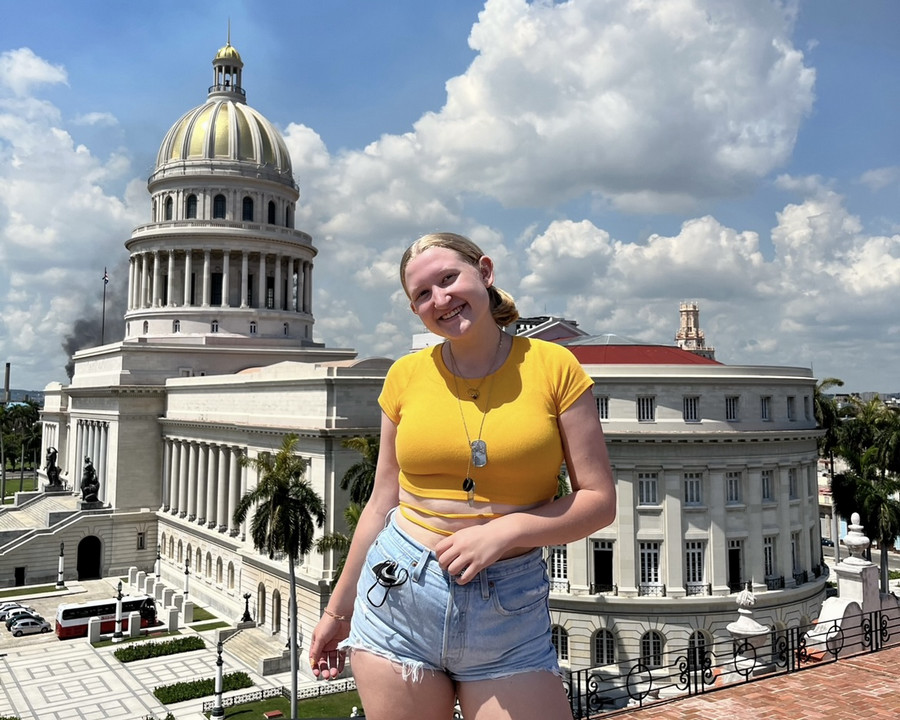Profile: Cailan Frink '24

Major/minor: Biology and Health: Science, Society, and Policy majors, Chemistry and Hispanic Studies minors
Study abroad program: Brandeis in Mérida: Public Health in the Yucatán Peninsula, Summer 2023
Reason you chose this program: As a STEM major, I wasn't expecting to find a study abroad program that checked all of my boxes and was at a convenient time, but Brandeis in Mérida did just that. I was able to practice my Spanish without the added pressure of taking classes in the language, and I was able to study public health programs and systems throughout the world, which has been a very large interest of mine for a while.Favorite class: My favorite class was definitely HSSP 136a: Comparative Public Health Systems in Latin America. This class expanded my perspective on the possibilities of what public health can look like. I especially enjoyed this class in conjunction with our time in Cuba, as it provided real-world tangibility to the content we were covering.
How did you incorporate your Brandeis areas of study into your study abroad experience? My study abroad experience was, quite literally, made for my major. Brandeis in Mérida is an HSSP program, so my major was integral to everything being taught. That being said, I wasn't planning on majoring in HSSP until halfway through the program. I entered as a biology major and planned to leave as one. I still incorporated this into the program, though, as someone who is specifically pre-health. I took it as an opportunity to expand my knowledge of health overall to hopefully provide better healthcare in the future. Additionally, I was able to have a more scientific backing to my contributions to discussions throughout the program.
Housing situation: I lived in a homestay family with two parents, four young-adult kids, two dogs, and a cat. My homestay experience was wonderful, and I never felt short of supported and cared for during my time there. From recommending me places to hang out in el centro, to buying my favorite snacks at the grocery store, to throwing me a birthday party, my host family was nothing short of amazing.
What were some parts of your identity that you thought about while considering study abroad that other students may want to talk to you about? When thinking about study abroad, I definitely was thinking about how the culture where I would go would receive me being a part of the LGBTQ community, both as a queer and a genderqueer individual. Also, I am an individual with a disability, which is definitely something I had to consider when going abroad.
Did you apply for any scholarships? If so, which ones and how did they impact your time abroad? I applied for the Sachar Study Abroad Scholarships, and it made my study abroad time possible. There's nothing else to say, honestly. Without my scholarship, I couldn't have afforded the extra tuition of summer classes. I also got a need-based travel grant that supplied me with the funds for the flights to and from my program.
Favorite memory: One of my most cherished memories is from one of my first weeks in Mexico. My host family had two houses - one in town and one on the beach. They took me to their beach house. We all sat around the table, joking and having good conversation, but my favorite part was talking to my host sister, Mari Fer, for actual hours whilst wading in the ocean. It was one of the first times I started to truly connect with her, one of the first times I started to feel like I actually can communicate in Spanish, and just such a wonderful memory. Plus the sunset on the beach definitely helped!
Greatest challenge: I think my greatest challenge abroad was finding food that I'd like. I'm a very picky eater, so it can definitely be difficult for me to find things to eat. My host family was very good about finding options for me, though.
What you know now that you didn't know before: I learned so much during my time abroad. Not just about the indigenous cultures that are so precious and engrained in the Mexican culture, but also about myself. I can confidently say that I left Mexico knowing some Mayan words, that salbutes are the best food on the planet, and that I can do so much more than I think I'm capable of.
Fact about Rome that you think people would be surprised to learn: Mexico has almost 70 indigenous cultures, each with their own language and collectively surmounting more than 350 various dialects of speech.
“I learned so much during my time abroad. Not just about the indigenous cultures that are so precious and engrained in the Mexican culture, but also about myself.”
Cailan Frink '24